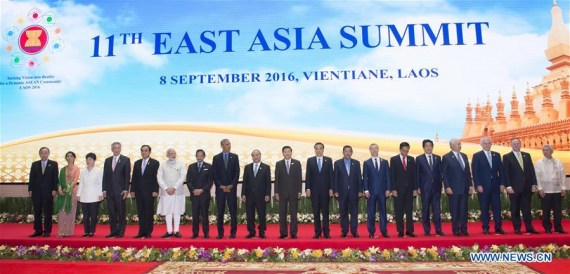
Chinese Premier Li Keqiang (9th R) attends the 11th East Asia Summit in Vientiane, Laos, Sept. 8, 2016. (Photo: Xinhua/Wang Ye)
Chinese Premier Li Keqiang on Thursday spelled out China's stance on the South China Sea issue in his speech at the 11th East Asia Summit, calling for concerted efforts of all relevant parties to properly handle disputes.[Special coverage]
Li reaffirmed China's objection to the South China Sea arbitration, citing China's right under United Nations Conference on the Law of the Sea (UNCLOS) to settling disputes primarily through dialogue and consultation.
CONSULTATION AS PRIORITY
Li owed peace and stability in that area over the past more than a decade to "effective regional rules" set in the Declaration on the Conduct of Parties in the South China Sea (DOC) agreed by China and the Association of Southeast Asian Nations (ASEAN), in which concerned parties in any dispute should negotiate to settle it.
Noting that "we are neighbors, thus hard to avoid clashing with each other like tongue and teeth," Li said the move to initiate an arbitration unilaterally and introduce a third party could only make things more complex and thus undermine the rule-based regional order.
Li called for bringing sea disputes under control before they are settled.
"China and ASEAN nations have the full wisdom and ability to manage the South China Sea issue," Li said, adding that nations outside the region should "understand and support" the efforts made by nations within it, rather than "overstating differences or even sowing the discord."
On the "freedom of navigation and overflight" in the region, Li said it has never been a problem.
China and ASEAN on Wednesday issued a joint statement on the application of the Code for Unplanned Encounters at Sea (CUES) in the South China Sea as well as a guideline on senior diplomat hot line to cope with maritime emergencies.
Li stressed that China has always managed the South China Sea issue with a constructive attitude in order to guarantee regional peace and stability.
He expressed China's readiness to work with other parties to translate challenges in East Asia into an opportunity for stability and sustained prosperity.
TWO-PRONGED SUMMIT GOAL
In his speech, Li lauded the role of the East Asia Summit in advancing understanding and mutual trust of all parties and promoting regional stability and prosperity in East Asia, which he described as a land "far from conflicts and a bonanza for trade and investment."
Li also urged efforts to put ASEAN in a central position in East Asia cooperation and follow the "ASEAN model" which emphasizes consensus by taking into account the interests of all parties.
Li reaffirmed the two-pronged goal of economic development and political security for such a "strategic forum led by leaders."
On economic development, Li said all parties should place regional connectivity high on the agenda, step up building a free trade area, and cooperate more on social undertakings.
On political security, Li called for formulating a new Asian security concept, which are "common, comprehensive, cooperative and sustainable."
Li reiterated China's diplomatic principles that all countries, big or small, are all equal, should respect each other, and seek common ground and shelve differences.
NON-TRADITIONAL SECURITY
Li also urged closer cooperation on non-traditional security issues including terrorism, natural disasters, trans-national crime and infectious diseases.
For their parts, the summit leaders agreed on establishing a framework that can effectively meet non-traditional challenges.
They agreed to settle South China Sea disputes by peaceful and diplomatic means based on the DOC and the Code of Conduct in the South China Sea (COC) and look forward to strengthening economic partnership and deepening economic integration.


















































